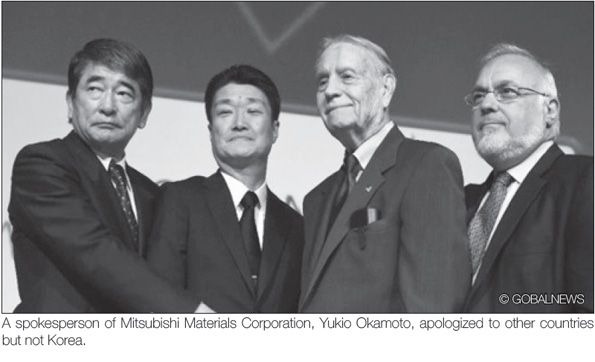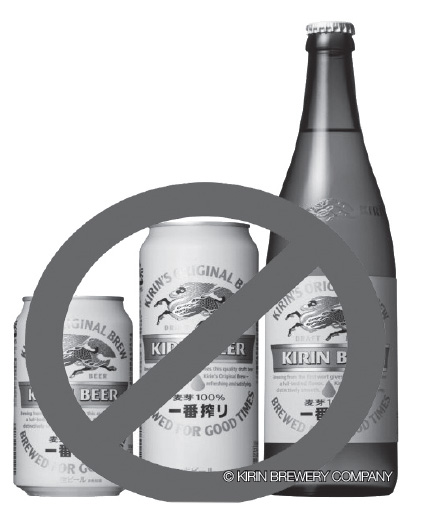
In April, Song Hye-gyo refused to be an advertising model for Mitsubishi motors, an affiliate of Mitsubishi Group, which has been infamous as a war criminal enterprise since the Second World War. The management company of Song Hye-gyo said she did that because of the fact that Mitsubishi is a war criminal enterprise and was sued for forced labor in the Japanese colonial era in Korea. It was noted by many people and it attracted people to stage a boycott.
War criminal enterprises are the companies that earned money by making and selling war supplies -especially murder weapons- or mobilizing colonized people from poor countries by force. One committee, which is managed by the prime minister of Korea, revealed that the number of existing Japanese war criminal corporations is 299. Famous companies to many Koreans, Nissan, which is an automobile enterprise, Kanebo Cosmetics Inc., Kirin Brewery Company and Panasonic are all included. The top three Japanese companies, Mitsubishi, Mitsui and Sumitomo Group are war criminals as well.
The reason why these enterprises have gotten bad reputations is that they haven’t apologized and haven’t compensated enough yet. More importantly, Mitsubishi and Hitachi, two heavy industries, did not apologize, even though they profited a lot from the construction business of thermal power generation in Korea. We have seen that Mitsubishi apologized and compensated to other countries except Korea. On July 22, 2015, a spokesperson of Mitsubishi Materials Corporation, Yukio Okamoto, said, “We want to apologize to the British, Dutch and Australian prisoners of war who were hunted for forced labor during the Second World War.” in a foreign press conference in Tokyo. Mitsubishi also apologized to American prisoners of war recently.
The newspaper Hankyoreh analyzed the grounds for Japan’s stubbornness. It is that Japan insisted that mobilization of Koreans for forced labor was lawful because of a national mobilization law adopted in 1938. In contrast, the Chinese who were mobilized by force were soldiers’ captives, so it is different from Korea. Japan also insists that Korea already got 500 million dollars as a claim in the Korean-Japanese Conference, which was held in 1965. They said these matters were resolved.

On the other hand, the war criminal enterprises of Germany are different from Japan. BMW acknowledged their faults made in the Nazi period. They discovered that they mobilized about 50,000 people for forced labor to munition factories and were cooperating with Nazis. 80 forced laborers died on average per a month and many were executed. Accordingly, BMW, the German government and other companies established the Remembrance, Responsibility and Future Foundation and held a memorial ceremony for victims of Nazis and provided about 4 billion euro to 1,666,000 people of 100 nations. It is not just BMW. Volkswagen, Dimler-Benz AG and Deutsche Bank, among other companies, voluntarily began to reveal the cooperation with Nazis fact by hiring experts.
Oh Je-myeong, a professor in the Dept. of German Language and Literature in CBNU, analyzed, from a historic and cultural viewpoint, the reasons why Japanese and German companies have differences in the ways of apologizing and compensating after the Second World War. He said, “After finishing the war, Germany was divided into East and West. Because the West was capitalist, they didn’t punish Nazi-cooperating people or companies enough. Similarly, Japan was also capitalist and didn’t punish war criminals or companies enough. However, since then, Germany had a big turn in politics, and through this change, they began to apologize continuously to many countries. Meanwhile, Japan didn’t have any change in politics. Japan still has insisted that they settled their brutality enough through the Korean-Japanese Conference. However, it is difficult for us to feel their sincerity, in comparison with Germany’s efforts, to make amends.”
Bak Hong-yeong, a professor of the Dept. of Political Science and International Relations in CBNU, said, “Legally, receiving an apology from Japan is difficult because the Korean-Japanese Conference was already conducted. Laws among nations can’t be reversed. If they are reversed, the international society wouldn’t trust the nation anymore. However, morality is also important. To obtain the apology, we have to handle this problem from three dimensions: citizens, government and media. Citizens can bring up the problems of human rights and ethics. The government can issue a statement that, although finished in legal aspects, isn’t finished yet because Korean citizens have changed and are more mature now. The government also can issue that, in order to have an amicable relationship between Korea and Japan, showing sincerity is essential. The media also should deal with this problem steadily and consistently.”
By Shin So-hyeon
sh36@cbnu.ac.kr


 All
All Experience
Experience






 Shin So-hyeon
Shin So-hyeon











